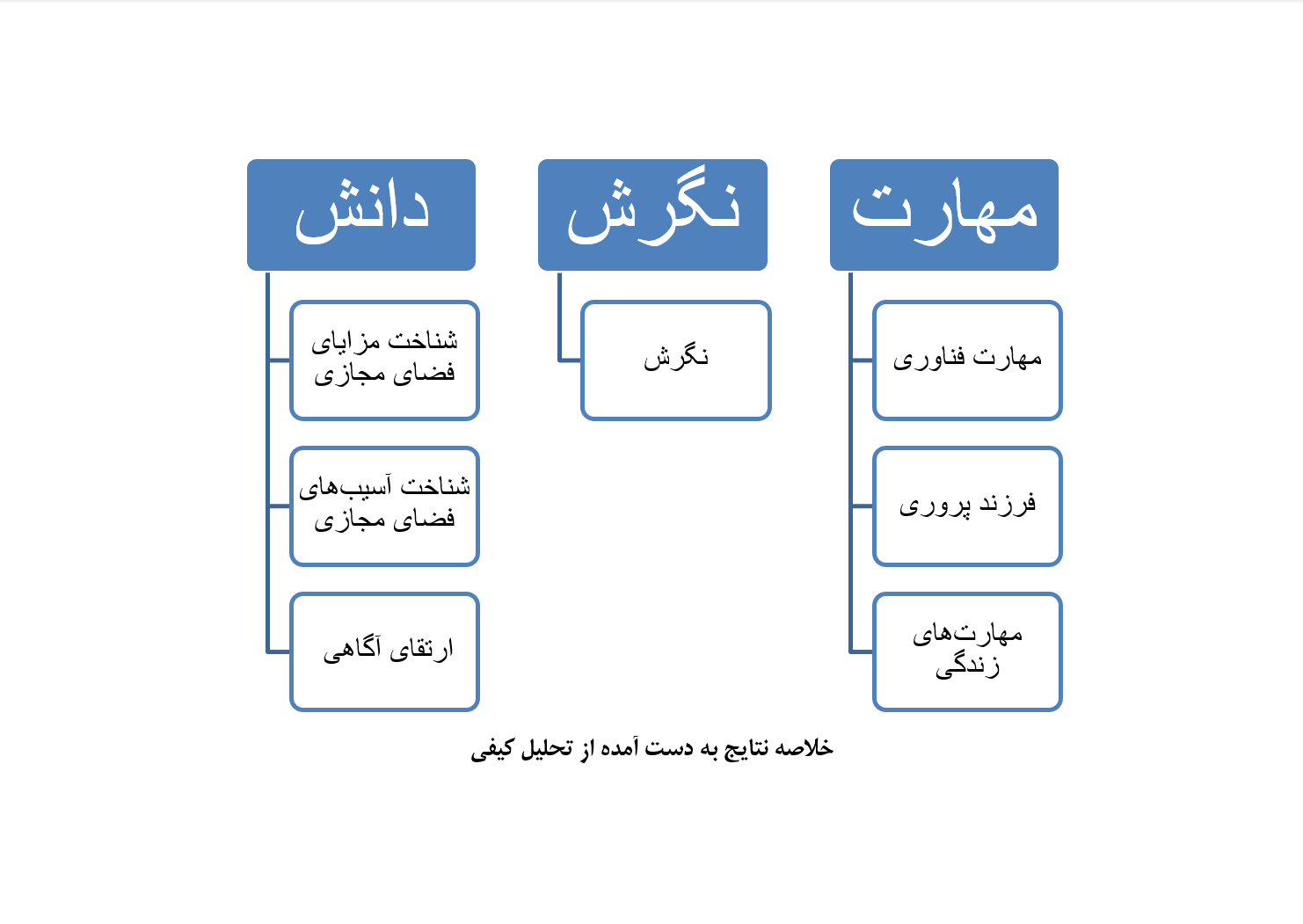A Comprehensive Model for Parental Education Content to Prevent Cyber-Space Harm in Students
Keywords:
Parental education, prevention, harm, cyberspaceAbstract
Today’s era is known as the era of cyberspace, which experts describe as a double-edged sword. On one hand, the significant influence of cyberspace on all aspects of social life is undeniable, and on the other hand, its harms and threats have also drawn the attention of experts. The aim of the present research is to propose a content model for parental education to prevent the harm of cyberspace among students. This research employs a qualitative method and is applied in nature. The statistical population of this research consists of specialists in the field of cyberspace, with a sample of 11 experts selected using theoretical saturation and convenience sampling. The data collection methods include a review of the literature and semi-structured interviews with experts and specialists. To validate the findings, expert opinions were used, and to ensure reliability, the coefficient of agreement between coders was applied. Data analysis was performed using coding methods. The findings indicated that the content of parental education for preventing cyberspace harm should encompass three components: knowledge (benefits of cyberspace, understanding cyberspace harms, and enhancing parental awareness), attitudes, and skills (technological skills, parenting, and life skills). It can be concluded that by developing their knowledge, skills, and attitudes toward cyberspace, parents can reduce the risks associated with cyberspace for their children to some extent.
Downloads
References
Jahantighi F. Investigating the effects and social harms of cyberspace on children. Journal of Psychosociological
Research in Family and Culture. 2023;1(1):18-22.
Egami S, Nishimura S, Fukuda K, editors. A framework for constructing and augmenting knowledge graphs using
virtual space: Towards analysis of daily activities. 2021 IEEE 33rd international conference on tools with artificial intelligence
(ICTAI); 2021.
Walker S, Hei C, Cheng B, Rattenni A, Reynolds C, Lapham S, editors. Parent and educator perspectives on the
benefits of an online space to promote offline program collaborative learning2019.
Khalkhali M, Niaz Azari K, Enayati T. Identifying Moral Damages Caused by the Lifestyle of Students Affected by
Cyberspace. International Journal of Ethics and Society. 2023;5(2):49-57.
Vigo-Arrazola B, Dieste-Gracia B. Building virtual interaction spaces between family and school. Ethnography and
Education. 2019;14(2):206-22.
Shahmohammadi G. Strategies for situational prevention of cyberspace damage. Naja Scientific Journal of Strategic
Studies. 2015;1(2):101-44.
Zandkarimi G, dehdast K, Karbalaee Shalbaf Z. Codification and Validation of Adolescents Parenting Program in
Cyberspace. Counseling Culture and Psychotherapy. 2022;13(51):1-30.
Taghizadegan M. Child and cyberspace: Analysis of parental mediation in children's use of the Internet. Cultural
Studies & Communication. 2023;19(72):201-28.
Asadi N. Investigating the ways of parental intervention in children's use of media. Rasaneh. 2020;31(3):83-110.
Cho-Hee BC, editor How to Keep Your Child Safe in Cyberspace and When He or She Stays at Home Due To.
Webinar on Social Sciences Issues Social Media; 2021.
Trumello C, Vismara L, Sechi C, Ricciardi P, Marino V, Babore A. Internet Addiction: The Role of Parental Care and
Mental Health in Adolescence. International Journal of Environmental Research and Public Health. 2021;18(12):12876.
Fleury I, Dowdy E. Social Media Monitoring of Students for Harm and Threat Prevention: Ethical Considerations for
School Psychologists. Contemporary School Psychology. 2020:1-10.
Wang S, Wang W, Guan S, Guan N, editors. Research on cyberspace security education for teenagers based on data
analysis. Proceedings of the 2nd International Conference on Information Technologies and Electrical Engineering; 2019.
Hamedi F, Motallebi N. Examining the Cultural and Social Issues of Teachers and Parents about Virtual Education,
as well as Innovative Solutions. NeuroQuantology. 2022;20(11):9443.
Seyhan AA, Carini C. Are innovation and new technologies in precision medicine paving a new era in patients centric
care? Journal of translational medicine. 2019;17(1):114.

Downloads
Published
Submitted
Revised
Accepted
Issue
Section
License
Copyright (c) 2024 Journal of Study and Innovation in Education and Development

This work is licensed under a Creative Commons Attribution-NonCommercial 4.0 International License.










